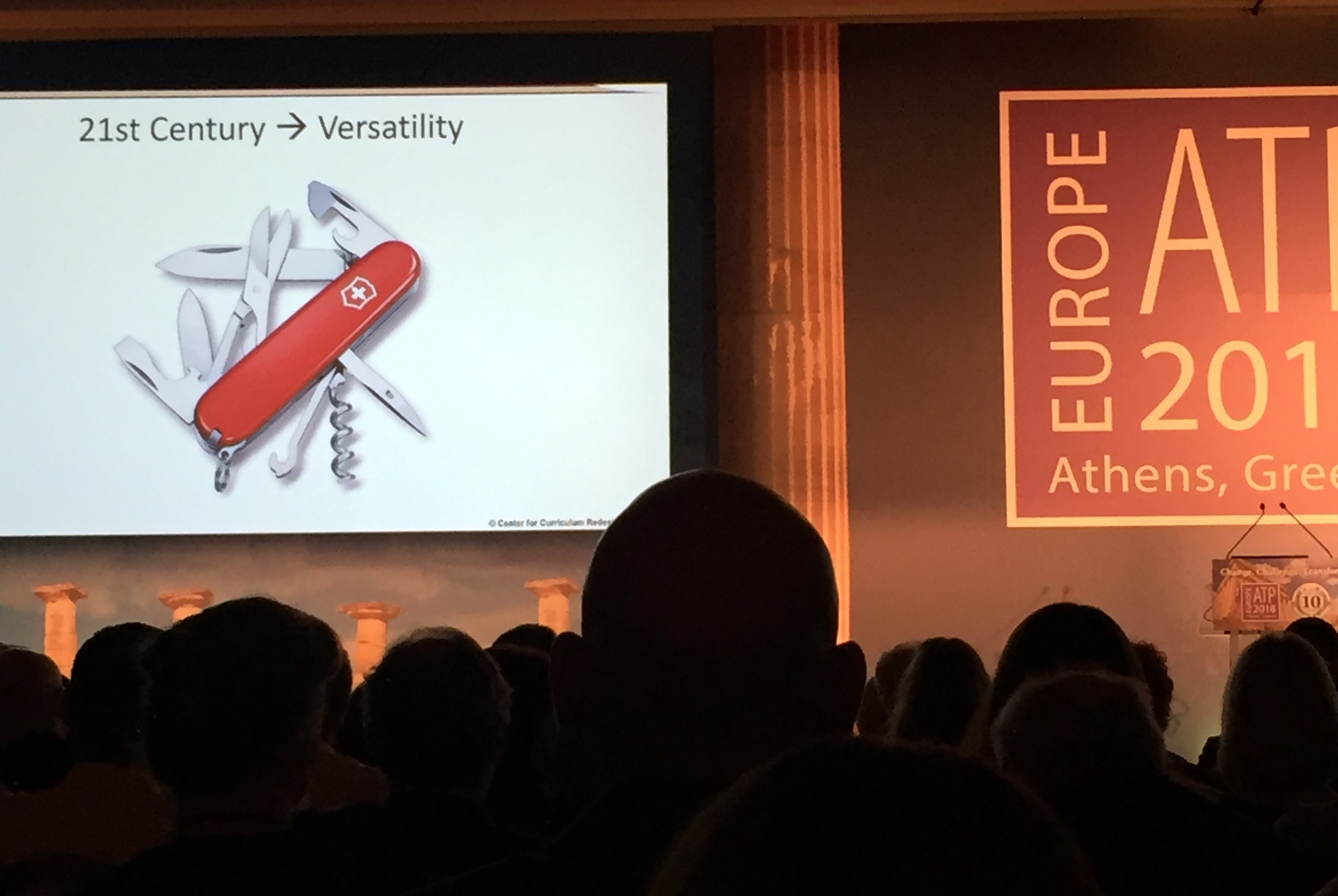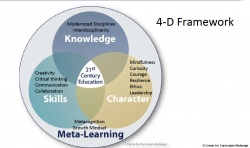
“Versatility” is the key 21st century skill
by Pisana Ferrari – cApStAn Ambassador to the Global Village
How can schools prepare students “for jobs that have not yet been created, to use technologies that have not yet been invented and to solve social problems that we don’t yet know will arise”? A thought-provoking introduction by Andreas Schleicher, Director for Education and Skills at the OECD, to the book “Four-Dimensional Education”, authored by Charles Fadel, Maya Bialik and Bernie Trilling. The book received rave reviews when it was published, in 2015, from academics, NGOs, and corporate worlds, and has played an important role in the ongoing debate around 21st century skills. Three members of the cApStAn team had the pleasure of listening to a presentation by one of the co-authors, Charles Fadel, titled: “Learning and Assessments for the age of Artificial Intelligence (AI)”, at the recent E-ATP conference in Athens.
“AI is applied everywhere” says Fadel, from speech and video content recognition, natural language processing, machine learning and translation, to virtual assistants and smart robots. Examples he gave included some chilling AI-generated music and art. The next obvious question, he says, is “what will our children need to be successful in an AI world”? A Swiss pocket knife on one of his slides symbolises what he believes to be the key 21st century skill: “Versatility”. The following slide reads “Renaissance men needed!” Yes. But how do you define versatility? “We must help prepare our students to be versatile enough to succeed no matter how our unpredictable world changes around us”… Fadel lists four key elements/Skills: Creativity, Critical thinking, Communication, and Collaboration. Then, comes what Fadel calls “Character qualities”: Mindfulness, Curiosity, Courage, Resilience, Ethics, and Leadership, qualities that are of very high importance once students enter the workplace. “Knowledge” of modernized disciplines, in an interdisciplinary context, and “Meta-learning”, which is about metacognition and growth mindset, complete the four-dimensional framework envisioned by Fadel & Co in order to make education more relevant in a world of exponential change.

- “Knowledge” is related to “what we know and understand”;
- “Skills” are about “how we use what we know”;
- “Character qualities” are about “how we behave and engage in the world”;
- “Meta-learning” relates to “how we reflect and adapt”.
The latter three can be defined as “Social & Emotional Skills” = “21st Century Skills”
What needs to be done now? Here is Fadel’s recommendation: “a deep re-examination of every single branch, subject, topic, item……while fighting biases, groupthink, politics, etc.” So, on the one hand, it is the curriculum that needs to be redefined. On the other, one of the factors “holding us back” is the way assessments are currently being done. “The science of assessments is lagging behind” he says. The mission of ARC (Assessment Research Consortium, part of the CCR, see below), is precisely to catalyse the development of systems of assessments around the above-mentioned competencies: Skills, Character, Knowledge and Meta-Learning. This will be done by advancing and disseminating research, development and practice. Fadel ended his presentation with an ironic syllogism: “Lack of/poor education is at the root of human problems. Assessments define the education we get. Assessments are the root of human problems”. Food for thought.
Fadel challenged the testing industry, represented in large numbers at E-ATP, not only to accompany, but actively to contribute to drive the drastic change in skills that this generation and the next need to acquire and utilise. This is also relevant for us at cApStAn LQC: we have accumulated two decades of experience in organising and supervising translation/adaptation processes in a large number of assessments of both cognitive and non-cognitive skills. We have engineered linguistic equivalence in international large-scale assessments as well as in psychological screening tests, in talent management instruments as well as in admission exams to higher education. We are both keen to stay on top of new developments in the testing industry, and keen to share our methodology with test publishers who go international. We are part of this revolution.
Notes
“Four dimensional education”: Charles Fadel, Maya Bialik and Bernie Trilling, published by the Center for Curriculum Redesign, 2015.
Charles Fadel is a global education thought leader and futurist, author and inventor, with several active affiliations; his work spans the continuum of Schools, Higher Education, and Workforce Development/Lifelong Learning. He is Founder and Chairman of the Centre for Curriculum Redesign, source: https://curriculumredesign.org/about/team/#charles
The Center for Curriculum Redesign (CCR) is a non-profit global organization dedicated to improving education via answering the question: “What should students learn for the 21st century?” The CCR brings together international organizations, jurisdictions, academic institutions, and non-profit organizations including foundations. It focuses on both designing and propagating new curricula. https://curriculumredesign.org/about/
Photo taken the E-ATP conference in Athens.
4-dimensional education photo from Charles Fadel slides at E-ATP conference in Athens.